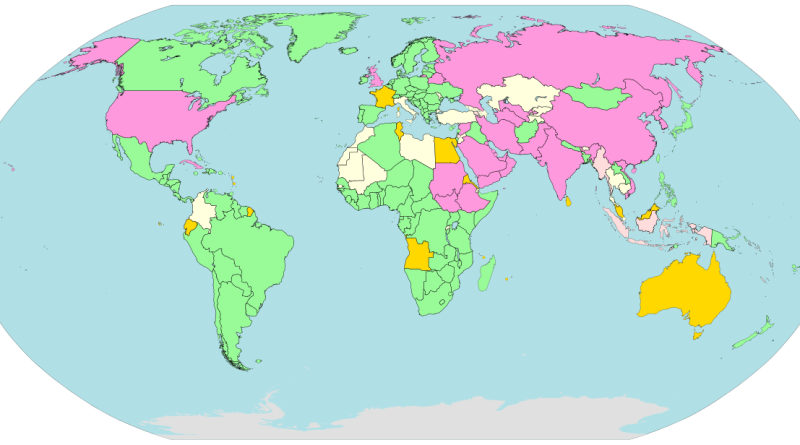On Bypassing Institutions – The Internet in Rebellion
Grand Ideas, or Grand Illusions?
Institutions have always played a pivotal role in shaping both local and global cultures (a phenomenon widely and increasingly observed with the advent of the post-War, American-led neoliberal world order – which led to an entrenchment of the Capitalistic worldview now considered to be the norm of the age). The long-standing power centers of Religion, Scientific Convention, Monarchical Rule (historically legitimized, in turn, by the faithful), Tradition and the Nation achieved their maximal consolidation during the post-Renaissance centuries – with modernity largely reaping the fruits of these institutional enterprises in the form of the ascendancy of these grand narratives. Settler colonialism, the alleged superiority of the Occident over the backwards Orient, post-enlightenment understandings of science, logic and rationality as the new-age dogma to be adhered to in place of all abstract and empirically unverifiable metaphysical notions, and a dismissive attitude towards all forms of government other than Western-styled democratic republicanism were only some of the more over-arching conceptions that gave rise to the global zeitgeist of the last century (largely influenced by the innovations of the preceding eras, and still of grave contemporary relevance to us). The postmodern age often cited as starting somewhere in the early 60’s, and which may only be an extension of modernity (according to some accounts) saw the intellectual community posing a significant ideological challenge to the sociological hegemony of these meta-accounts – by exposing deep fissures in their logic structures. Academicians greatly employed the use of such new-age innovative technologies as the internet (aided, in turn, by a long list of ISP vendors, such as COX Communications), to launch their anti-foundational assaults against the status quo.
Creating the Status Quo, and dismantling it…
All established institutions (be they those backed by the state, or those on the perpetually dissenting side of the spectrum) are essentially knowledge-producers; a power-begetting and reinforcing process they engage in both spontaneously and purposefully. This synthesized version of ‘knowledge’ largely sets up the cultural sphere of a geographical location – where it covertly naturalizes itself into the easily digestible formations of ‘the Truth’, ‘Convention’ and ‘common sense’, as well as such assertions as the popularly touted ‘the way it is’ aphorism and those like it that declaim a similar tune. Similarly, and by way of reaction, there are dissenting institutions that form part of the same discursive field – and vociferously (or humbly – depending upon the writ of the state in imposing its censorship) proclaim their versions of the deemed ‘correct’ knowledge. It is this constant, cyclical tug-and-pull of contesting knowledge-accounts, with each trying to validate its credibility in place of the other and attempting to assimilate themselves with the collective conscience of the undiscerning masses, which forms the ideological wellspring of culture. And this process is always political; always socially constructive. These theories of culture arose on the academic scene as the results of introspection carried out by such acclaimed public intellectuals as Michel Foucault, Paul De Man, Edward Said and Jacques Derrida (among many others who exhibited deconstructionist tendencies in the last century, and continue to do so today).
The Internet: the Rebel’s Catapult
Historically, the balance of power has always favored state-endorsed entities and fanned the ideas they promoted far and wide inside the cultural sphere. The advent of the Internet age (which saw private universities and research institutes fully integrated with the ideas-disseminating medium of the Internet – through fast-speed connections powered up by COX Communications, and other leading ISP companies) enabled academics and researchers to proliferate their poststructuralist views to the public, and gave rise to the multiple narratives current that gradually dominated the social scene. Nowadays, there is a tendency among parts of the general public (particularly in western countries – where these cutting-edge postmodern ideas have been thoroughly appropriated by many) to look with a great deal of suspicion and skepticism at any grand institutional or ideological conception, which seeks to impose its monopoly over, and in place of, other ideas that are deemed to be ‘equally plausible’.
Service Reliability is Key
In order to pose a virulent opposition to convention, it is important for scholars to continuously publish their findings through both print and electronic mediums – and make them readily available for popular consumption. They can only do so if they happen to be equipped with stable and reliable internet connections that promise both stellar services quality and consistent speeds. In this respect, COX Internet continues to remain the web-connection service of choice for these busy professionals and their charged students.
COX Communications offers a dynamic assortment of lightning-fast Internet services and Internet-Cable T.V-Digital Phone services-inclusive bundle plans. So whether you want to subscribe to a separate plan from among the ones listed, or wish to experience the entire lot at an affordable monthly price – with COX, your options for doing so are many (minus any service-related headaches).
To view all subscription offers from COX, simply log onto getcableinternetdeals.com right now – and consider making your order today!
Author Bio:
Angelica Dowson is a writer and blogger with verified skills. She likes to write about technology, digital media. Currently, she is working with Cox Internet deals which are in ceiling business of cable, internet and phone. To know more about her find her on Twitter @angelicadowson1
